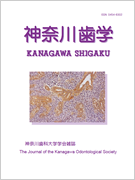- HOME
- > 一般の方
- > バックナンバー:神奈川歯学
- > 38巻4号
- > アブストラクト
アブストラクト(38巻4号:神奈川歯学)

English
| Title : | Some Comments about the Literature Pertaining to Rhythmic Masticatory Muscle Activity |
|---|---|
| Subtitle : | Dentistry,Quo Vadis?(3) ストレスと脳と咬合 |
| Authors : | Martin Peters |
| Authors(kana) : | |
| Organization : | Kanagawa Dental College, Bioventure Research Project Research Center for Advanced Technology for Craniomandibular Function |
| Journal : | Kanagawa Shigaku |
| Volume : | 38 |
| Number : | 4 |
| Page : | 180-184 |
| Year/Month : | 2003 / 12 |
| Article : | Report |
| Publisher : | Kanagawa Odontological Society |
| Abstract : | We chew, we talk, we swallow, we smile the common denominator of these actions is that they are centered in and around the mouth or oral cavity. Some researchers have called this part of human anatomy the "masticatory organ, " but, while it is certainly true that teeth, tongue, gums, cheeks, and the associated nerves and muscles take part in mastication, this term misses the opportunity to convey a sense of the diverse functions that are made possible by the existence of those physical structures in the region of the upper and lower jaws. This term implies that masticating is the most important of the several functions of the equipment of the craniofacial region and that speaking, for example, is an auxiliary use of the equipment that is only incidental to the primary purpose. With the present climate of tension between nations of the world, however, and the clear need for humans to communicate with one another, it might just as well be argued that speaking, not masticating, is the primary function of craniofacial equipment. |
| Practice : | Dentistry |
| Keywords : |
